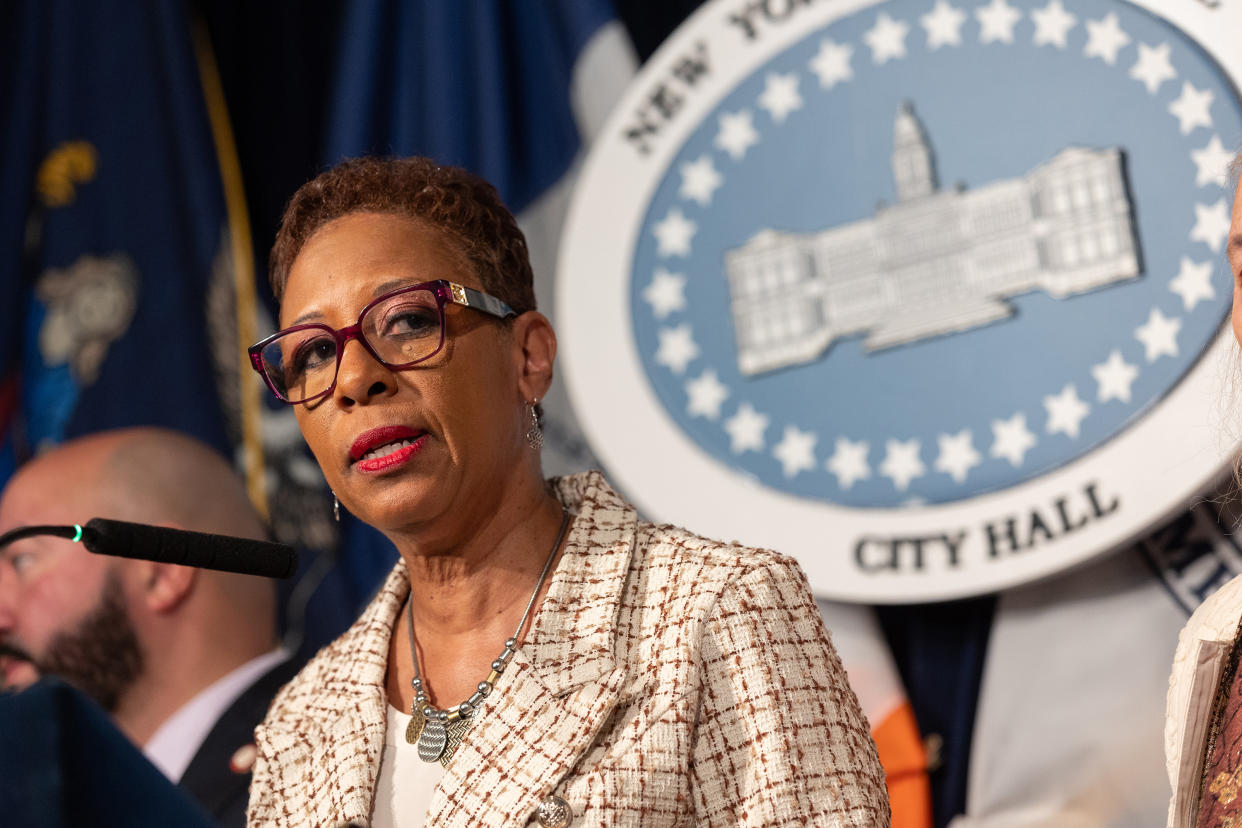Council speaker laments NYC affordability crisis in State of the City speech: ‘We can and must do better’

NEW YORK — Council Speaker Adrienne Adams took aim at New York’s skyrocketing costs of living in her annual State of the City address Wednesday and floated a handful of proposals she argued will help turn the tide on the problematic trend.
The speaker, whose Democratic Council majority has clashed intensely with Mayor Eric Adams on policy and budgetary matters in recent months, did not explicitly blame him for the city’s troubles in her speech. But she suggested the city’s workforce and social safety net has been weakened under his two years in office and drew a parallel between that and issues of affordability in housing, health care, childcare and education.
“A lack of capacity within our city agencies has undermined access to assistance that families could once rely on. This does not have to be our reality,” the speaker said before a packed Brooklyn Academy of Music audience that included the mayor. “We know our government can work because it has before. We’ve got to get back to basics — strengthen our city government to work for all New Yorkers.”
“We can and must do better,” she said.
A persistent struggle for the mayor’s administration has been to process public benefits like food stamps and cash assistance within a legally required time frame, an issue exacerbated by staff shortages at the city’s Human Resources Administration.
Even though the mayor touted earlier this month that his administration has nearly cleared a backlog of tens of thousands of overdue public benefits applications thanks to reforms to the processing protocols, Human Resources Administration officials testified before the Council this week that more than 1,000 budgeted vacancies remain at the agency. Other city agencies have thousands more vacancies.
The speaker said a key starting point for the city must be to fill those vacancies.
To do so, she said the Council plans to establish a program in partnership with the City University of New York and DC37, the city government’s largest union, to “create pathways to careers and jobs in our municipal workforce.”
“This initiative will prioritize participants in CUNY programs to fill persistently vacant city job titles and provide students with the mobility and long-term security of a career in city government,” she said.
Though light on details, the speaker also said the program will include a separate track focused on hiring for seasonal jobs in city government, like the ones contained in the City Cleanup Corps initiative operated by the Departments of Parks, Sanitation and Transportation during the summer months.
“Our economic and job recovery has been uneven, and we must provide opportunities for people at every level to succeed,” she said.
Even before the speaker’s remarks, there was palpable tension between the mayor and Council members in the auditorium.
Brooklyn Councilwoman Crystal Hudson, who introduced the speaker, said in her remarks that the Council will “fight tooth and nail” in this year’s budget negotiations to reverse public library spending cuts enacted by the mayor. She also lauded the speaker for pushing for the “How Many Stops Act,” an NYPD transparency bill the mayor vetoed in January, a move that was then overridden by the Council in order to force it into law.
“I could say a lot,” Hudson added, as the mayor looked on from the front row, “but I won’t.”
In a statement after her address, the mayor focused on what he described as his “partnership” with the speaker.
“The priorities the speaker laid out today are our shared priorities: child care, housing, women’s health care, and more,” he said. “We look forward to digging into the speaker’s proposals and continuing to build on two years of collaboration with her and the City Council to deliver on our shared goals and make sure the city we all love works for working-class New Yorkers.”
Beyond municipal hiring, the speaker’s address echoed the mayor’s push for building more housing to tackle the city’s soaring rents.
She didn’t announce any new initiatives on that front, but said the Council will work with the mayor to adopt a citywide zoning law text amendment that his administration’s pushing to pave the way for more housing development across all five boroughs.
She also said the city can tailor the zoning amendment in such a way that would place new requirements on landlords as it relates to accepting CityFHEPS vouchers, which subsidize rent for low-income New Yorkers on open market apartments.
The speaker’s CityFHEPS reference comes as the mayor refuses to implement Council laws expanding access to the voucher program. The Council has joined a lawsuit seeking to compel the mayor to implement them.
Though she didn’t outline any specific plans, the speaker said another path for building more housing is incentivizing development of apartments on top of public libraries in the city. Such efforts have drawn controversy in the past, including when the city started building apartments on top of the Sunset Park Library in Brooklyn in 2015. A 174-unit affordable housing building is currently being constructed on land owned by the New York Public Library in Inwood, Manhattan.
Ultimately, the speaker agreed with the mayor that to truly make a dent in the housing crisis, state lawmakers in Albany must this year replace expired tax breaks incentivizing affordable apartment developments — an effort that failed during the 2023 session.
“It is imperative that Albany provides funding and tax incentives to help us achieve truly affordable housing and prevent New Yorkers from being priced out,” she said.
On childcare, the speaker reiterated that she finds the mayor’s cuts to the 3-K program unproductive and signaled her body will strive to reverse them as budget talks heat up this spring.
“We need to support children and families so they can grow their futures here,” she said.

 Yahoo News
Yahoo News 
